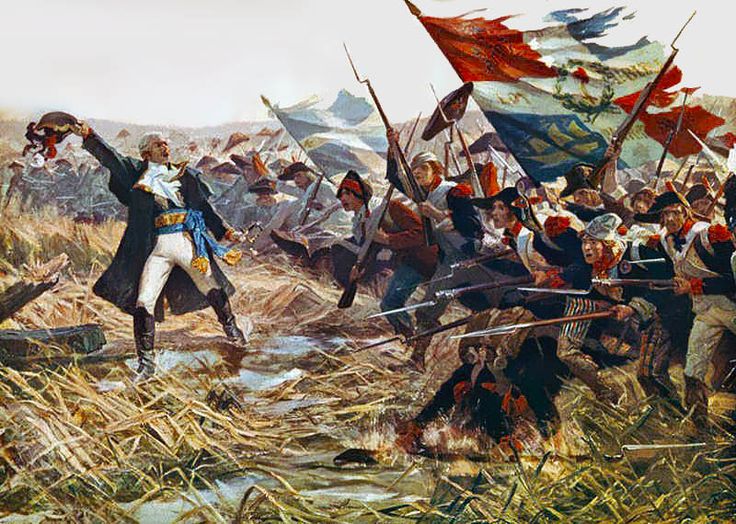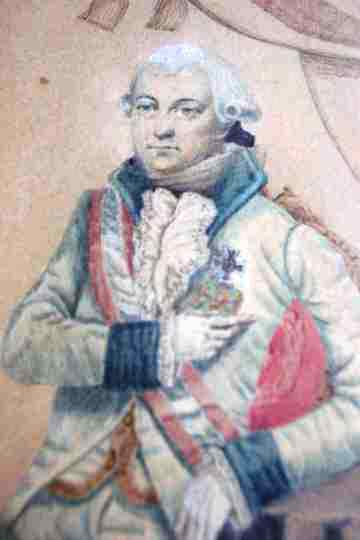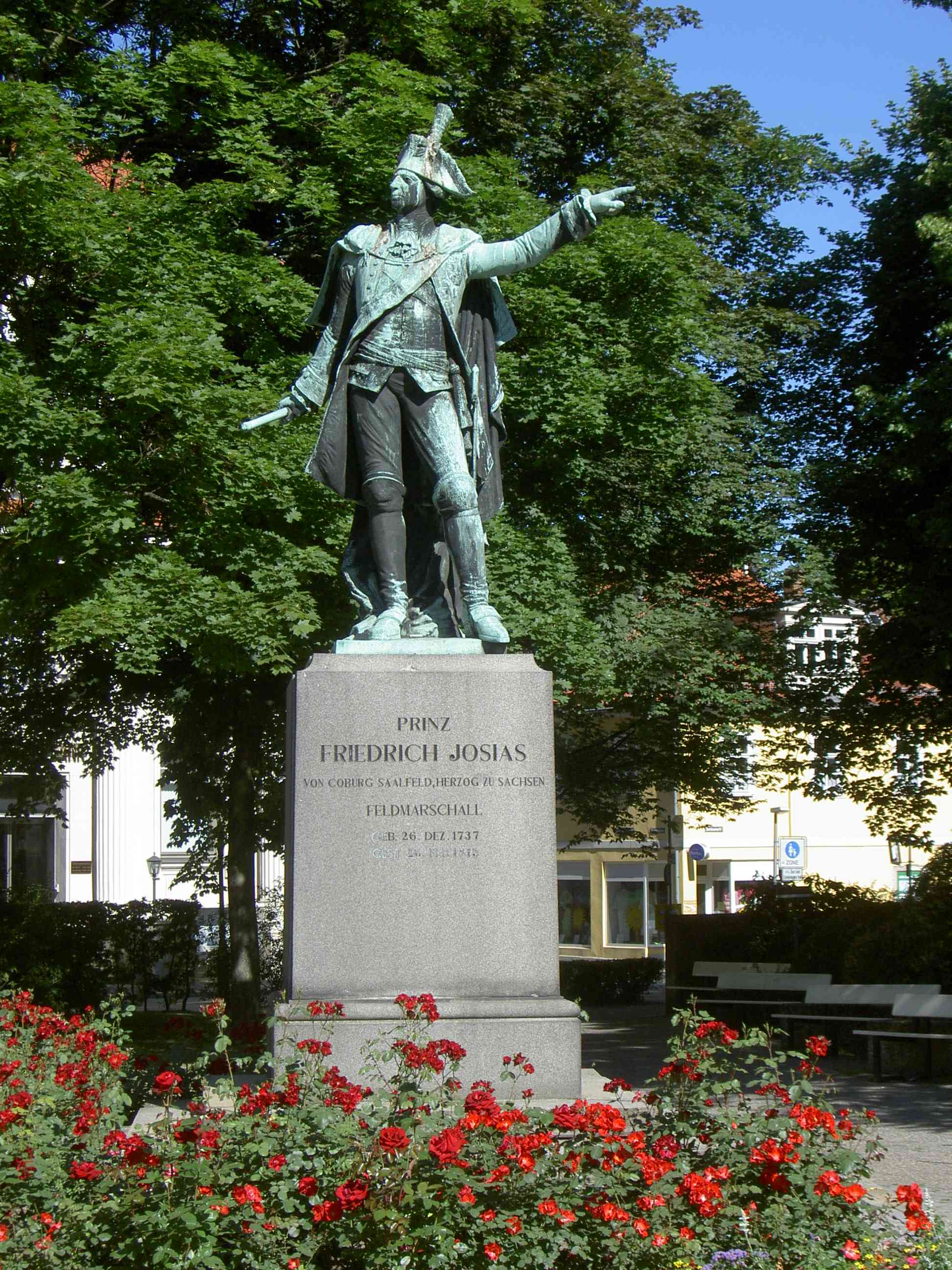|
Low Countries Theatre Of The War Of The First Coalition
The Low Countries theatre of the War of the First Coalition, also known as the Flanders campaign, was a series of campaigns in the Low Countries conducted from 20 April 1792 to 7 June 1795 during the first years of the War of the First Coalition. As the French Revolution radicalised, the revolutionary National Convention and its predecessors broke the Catholic Church's power (1790), abolished the monarchy (1792) and even executed the deposed king Louis XVI of France (1793), vying to spread the Revolution beyond the new French Republic's borders, by violent means if necessary. The First Coalition, an alliance of reactionary states representing the Ancien Régime in Central and Western Europe – Habsburg Austria (including the Southern Netherlands), Prussia, Great Britain, the Dutch Republic (the Northern Netherlands), Hanover and Hesse-Kassel – mobilised military forces along all the French frontiers, threatening to invade Revolutionary France and violently restore the m ... [...More Info...] [...Related Items...] OR: [Wikipedia] [Google] [Baidu] [Amazon] |
War Of The First Coalition
The War of the First Coalition () was a set of wars that several European powers fought between 1792 and 1797, initially against the Constitutional Cabinet of Louis XVI, constitutional Kingdom of France and then the French First Republic, French Republic that succeeded it. They were only loosely allied and fought without much apparent coordination or agreement; each power had its eye on a different part of France it wanted to appropriate after a French defeat, which never occurred. Shusterman, Noah (2015). ''De Franse Revolutie (The French Revolution)''. Veen Media, Amsterdam. (Translation of: ''The French Revolution. Faith, Desire, and Politics''. Routledge, London/New York, 2014.) Chapter 7, pp. 271–312: The federalist revolts, the Vendée and the beginning of the Terror (summer–fall 1793). Relations between the French revolutionaries and neighbouring monarchies had deteriorated following the Declaration of Pillnitz in August 1791. Eight months later, Louis XVI and the Leg ... [...More Info...] [...Related Items...] OR: [Wikipedia] [Google] [Baidu] [Amazon] |
Adam Philippe, Comte De Custine
Adam Philippe, Comte de Custine (4 February 174028 August 1793) was a French general. As a young officer in the French Royal Army, he served in the Seven Years' War. In the American Revolutionary War he joined Rochambeau's ''Expédition Particulière'' (Special Expedition) supporting the American colonists. Following the successful Virginia campaign and the Battle of Yorktown, he returned to France and rejoined his unit in the Royal Army. When the French Revolution began he was elected to the Estates-General and served in the subsequent National Constituent Assembly as a representative from Metz. He supported some of the August Decrees, but also supported, generally, royal prerogative and the rights of the French émigrés. At the dissolution of the Assembly in 1791, he rejoined the army as a lieutenant general and the following year replaced Nicolas Luckner as commander-in-chief of the Army of the Vosges. In 1792, he successfully led campaigns in the middle and upper ... [...More Info...] [...Related Items...] OR: [Wikipedia] [Google] [Baidu] [Amazon] |
Franz Wenzel, Graf Von Kaunitz-Rietberg
Franz Wenzel, Graf von Kaunitz-Rietberg (2 July 1742 in Vienna – 19 December 1825 in Vienna) was an Austrian general who saw service in the Seven Years' War and Wars of the French Revolution. Life Kaunitz was the third son of the statesman Wenzel Anton von Kaunitz-Rietberg and his wife, Mary Ernestine (''née'' Countess Starhemberg). He remained unmarried. ;Military career Kaunitz was given a military education and volunteered to join the Austrian army at the beginning of the Seven Years' War as an ensign in the Trautmannsdorf Cuirassiers. He transferred to the Daun Infantry Regiment in 1759, and under Field Marshal Leopold Joseph von Daun rose to the position of Wing Adjutant, distinguishing himself at the Battle of Torgau, where he was severely wounded. After the peace of Hubertusburg in 1763, he was promoted to Colonel of the Baden Infantry Regiment (IR; later IR.23), and then in 1766 of the Emperor Joseph II Infantry Regiment (later IR.1). In 1773, he was promoted to G ... [...More Info...] [...Related Items...] OR: [Wikipedia] [Google] [Baidu] [Amazon] |
Johann Peter Beaulieu
Johann Peter de Beaulieu, also Jean Pierre de Beaulieu (26 October 1725, in Lathuy, Brabant, Belgium – 22 December 1819), was a Walloon military officer. He joined the Habsburg army and fought against the Prussians during the Seven Years' War. A cultured man, he later battled Belgian rebels and earned promotion to general officer. During the French Revolutionary Wars he fought against the First French Republic and attained high command. In 1796, a young Napoleon Bonaparte won some of his first victories against an army led by Beaulieu. He retired and was the Proprietor (Inhaber) of an Austrian infantry regiment until his death. Early career Born in Lathuy Castle, Jodoigne in the Austrian Netherlands (now Walloon Brabant, Belgium) in 1725, Beaulieu joined the Habsburg army in 1743 and fought in the War of the Austrian Succession. During the Seven Years' War he served first as an infantry officer and later on the staff of Feldmarschall Leopold Joseph von Daun. Beaulieu was wou ... [...More Info...] [...Related Items...] OR: [Wikipedia] [Google] [Baidu] [Amazon] |
François Sébastien De Croix De Clerfayt
François () is a French masculine given name and surname, equivalent to the English name Francis. People with the given name * François Amoudruz (1926–2020), French resistance fighter * François-Marie Arouet (better known as Voltaire; 1694–1778), French Enlightenment writer, historian, and philosopher * François Beauchemin (born 1980), Canadian ice hockey player for the Anaheim Ducks * François Blanc (1806–1877), French entrepreneur and operator of casinos * François Bonlieu (1937–1973), French alpine skier * François Cevert (1944–1973), French racing driver * François Chau (born 1959), Cambodian American actor * François Clemmons (born 1945), American singer and actor * François Corbier (1944–2018), French television presenter and songwriter * François Coty (1874–1934), French perfumer * François Coulomb the Elder (1654–1717), French naval architect * François Coulomb the Younger (1691–1751), French naval architect * François Couperin (1668� ... [...More Info...] [...Related Items...] OR: [Wikipedia] [Google] [Baidu] [Amazon] |
Prince Josias Of Coburg
Prince Frederick Josias of Saxe-Coburg-Saalfeld (; 26 December 1737 – 26 February 1815) was a military commander in the army of the Holy Roman Empire. He began his career at the age of 18 in a cavalry regiment with which he took part in the Seven Years' War. Coburg's bravery allowed him to quickly rise through the ranks. Promoted to colonel in 1759, he became a general officer in the following years and, in this capacity, took command of an army corps during the Austro-Turkish War. Coburg campaigned successfully in Moldavia where he won the battles of Focşani, Rymnik and Martinestje against the Ottomans, which earned him the rank of field marshal in 1789. Thanks to his extensive experience, Coburg was appointed supreme commander of the Imperial Army in the Austrian Netherlands at the beginning of the French Revolutionary Wars. He triumphed at the Battle of Aldenhoven, then at the Battle of Neerwinden in March 1793, but these victories were overshadowed some time later by ... [...More Info...] [...Related Items...] OR: [Wikipedia] [Google] [Baidu] [Amazon] |
Herman Willem Daendels
Herman Willem Daendels (21 October 1762 – 2 May 1818) was a Dutch military officer and colonial administrator who served as governor-general of the Dutch East Indies from 1808 to 1811. Early life Herman Willem Daendels was born on 21 October 1762 in Hattem, Netherlands. His father, Burchard Johan Daendels, served as a mayoral secretary; his mother was Josina Christina Tulleken. Daendels pursued a legal education at the University of Harderwijk and obtained his doctorate on 10 April 1783. Political activity In 1785, Daendels aligned himself with the Patriots, a faction gaining control in various Dutch cities. In September 1786, he unsuccessfully defended the town of Hattem against troops loyal to the stadholder. The following year, in September 1787, Daendels played a role in the defense of Amsterdam against the invading Prussian army, which aimed to reinstate William V of Orange. Subsequently, when William V regained power, Daendels fled to French Flanders to evade a dea ... [...More Info...] [...Related Items...] OR: [Wikipedia] [Google] [Baidu] [Amazon] |
Jean-Baptiste Jourdan
Jean-Baptiste Jourdan, 1st Count Jourdan (; 29 April 1762 – 23 November 1833), was a French military commander who served during the French Revolutionary Wars and the Napoleonic Wars. He was made a Marshal of the Empire by Emperor Napoleon I in 1804. He was also a Jacobin politician during the Directory phase of the French Revolution, serving as member of the Council of Five Hundred between 1797 and 1799. One of the most successful commanders of the French Revolutionary Army, Jourdan is best remembered in the Revolution for leading the French to a decisive victory over the First Coalition at the Battle of Fleurus, during the Flanders campaign. Under the Empire he was rewarded by Napoleon with the title of Marshal and continued to hold military assignments, but suffered a major defeat at the Battle of Vitoria, which resulted in the Empire's permanent loss of Spain. In 1815 he became reconciled with the Bourbon Restoration, and later supported the July Revolution and served ... [...More Info...] [...Related Items...] OR: [Wikipedia] [Google] [Baidu] [Amazon] |
Jean Victor Marie Moreau
Jean Victor Marie Moreau (, 14 February 1763 – 2 September 1813) was a French general who helped Napoleon Bonaparte rise to power, but later became his chief military and political rival and was banished to the United States. He is among the foremost French generals in military history. Biography Rise to fame Moreau was born at Morlaix in Brittany. His father was a successful lawyer, and instead of allowing Moreau to enter the army, as he attempted to do, insisted on Moreau studying law at the University of Rennes. Young Moreau showed no inclination for law, but reveled in the freedom of student life. Instead of taking his degree, he continued to live with the students as their hero and leader, and formed them into a sort of army, which he commanded as their provost. When 1789 came, he commanded the students in the daily affrays which took place at Rennes between the young noblesse and the populace. In 1791, Moreau was elected a lieutenant colonel of the volunteers of Ill ... [...More Info...] [...Related Items...] OR: [Wikipedia] [Google] [Baidu] [Amazon] |
Joseph Souham
Joseph, comte Souham (; 30 April 1760 – 28 April 1837) was a French general who fought in the French Revolutionary Wars and the Napoleonic Wars. He was born at Lubersac and died at Versailles. After long service in the French Royal Army, he was elected to lead a volunteer battalion in 1792 during the French Revolution. He was promoted to general of division in September 1793 after playing a prominent role in the defense of Dunkirk. In May 1794 with his commander absent, he took temporary command of the ''Army of the North'' and defeated the Coalition army at Tourcoing. He led the covering forces at the siege of Ypres and participated in the successful invasion of the Dutch Republic. He spent many years in occupation duties in Holland and then his career suffered because of his association with Pichegru and Moreau. Starting in 1809 he was employed in Spain during the Peninsular War, winning the Battle of Vich where he was wounded. When he was in army command again, he for ... [...More Info...] [...Related Items...] OR: [Wikipedia] [Google] [Baidu] [Amazon] |
Charles Pichegru
Jean-Charles Pichegru (; 16 February 1761 – 5 April 1804) was a French general of the Revolutionary Wars. Under his command, French troops overran Belgium and the Netherlands before fighting on the Rhine front. His royalist positions led to his loss of power and imprisonment in Cayenne, French Guiana during the Coup of 18 Fructidor in 1797. After escaping into exile in London and joining the staff of Alexander Korsakov, he returned to France and planned the Pichegru Conspiracy to remove Napoleon from power, which led to his arrest and death. Despite his defection, his surname is one of the names inscribed under the Arc de Triomphe, on Column 3. Early life and career Pichegru was born in a peasant family at Arbois (or, according to Charles Nodier, at Les Planches-près-Arbois, near Lons-le-Saulnier), in the then Franche-Comté (now in the Jura department of France). The friars of Arbois were entrusted with his education, and sent him to the military school of Brienne-l ... [...More Info...] [...Related Items...] OR: [Wikipedia] [Google] [Baidu] [Amazon] |
Charles Edward Jennings De Kilmaine
Charles Edward Saul Jennings (19 October 1751 – 11 December 1799) was an Irish-born French army officer who served under Napoleon. He was a staunch supporter of Irish independence from British rule in Ireland, while being an active supporter of the French Revolution. Kilmaine is known to have been an associate of Theobald Wolfe Tone, Thomas Paine and Napper Tandy. Kilmaine served in both the American Revolutionary War and the French Revolutionary Wars. He played a minor role in Irish Rebellion of 1798, going as far as to set up secret meetings between Wolfe Tone and Napoleon. Kilmaine was known for being one of the most charismatic Irish generals of the Revolutionary and Napoleonic period. Though he was not ennobled, he is sometimes referred to as de Kilmaine and Baron de Kilmaine in reference to the Jennings's ancestral home in Kilmaine, County Mayo. Early life Jennings was born on 19 October 1751 in Dublin at Saul's Court, Temple Bar. His father, Dr. Theobald Jennings ... [...More Info...] [...Related Items...] OR: [Wikipedia] [Google] [Baidu] [Amazon] |








